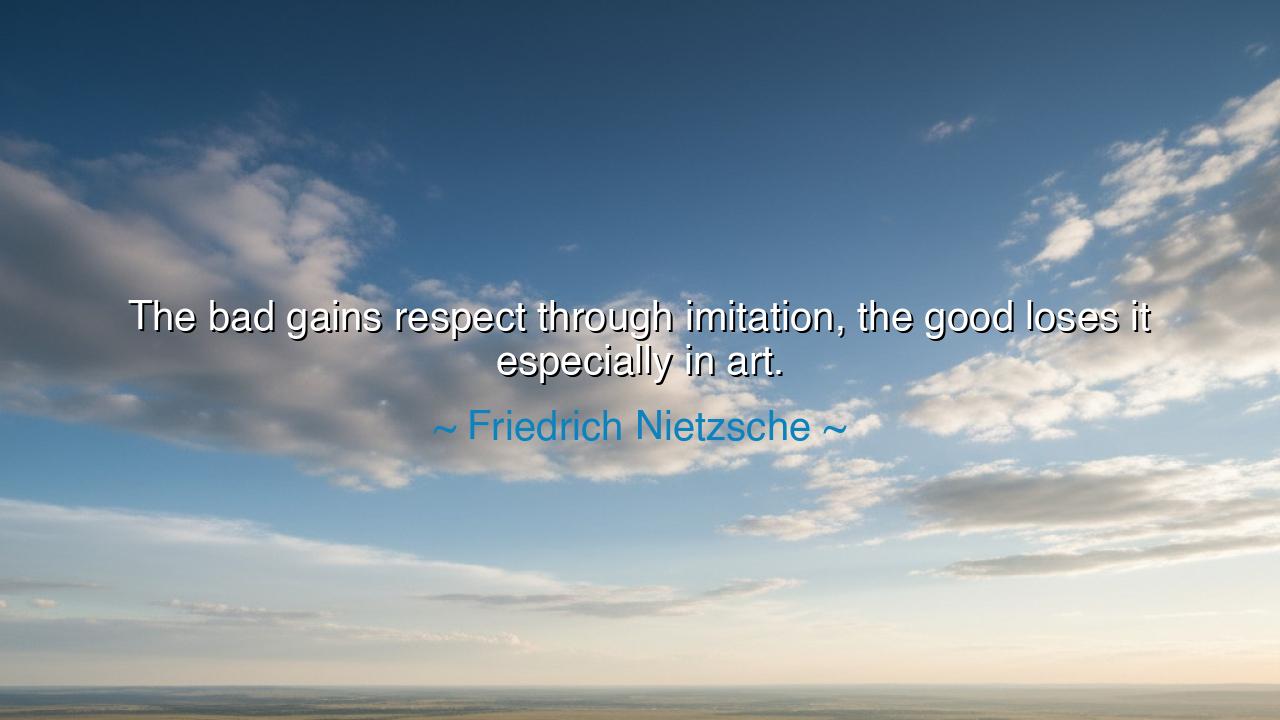
The bad gains respect through imitation, the good loses it






Hear the fierce and unsettling words of Friedrich Nietzsche, who declared: “The bad gains respect through imitation, the good loses it especially in art.” In this statement burns the fire of paradox, for he reveals a hidden truth about the nature of human admiration. That which is shallow, false, or unworthy may grow in stature when copied again and again, as if repetition itself lends it strength. Yet that which is truly good, noble, and rare often diminishes in power when imitated, especially in the realm of art, where originality is the breath of life.
The meaning of this utterance strikes to the heart of creativity. Imitation can elevate mediocrity, giving the illusion of greatness through constant repetition. When the bad is copied, it gains a kind of authority, not because of its merit, but because of its prevalence. We see this in art, in fashion, in culture: what is popular often seems respectable, not because it is profound, but because it is everywhere. On the other hand, the good, when imitated, loses its spark, for its essence lies in originality. True art springs from authenticity, and when copied, it becomes lifeless, a hollow shadow of its source. Thus, Nietzsche reminds us that respect built on imitation is an illusion, while greatness cannot be duplicated without decay.
The origin of this thought lies in Nietzsche’s philosophy of aesthetics and culture, where he warned against the decline of originality in an age of imitation. He saw that societies often venerate what is easy to reproduce rather than what is difficult to create. He lamented that greatness in art is fragile, for once it is imitated too often, it becomes cliché, stripped of the vitality that made it powerful. Nietzsche, who revered the bold, the creative, and the life-affirming, despised the herd instinct that elevates mediocrity while suffocating genius.
History offers us examples of this truth. Consider the art of the Renaissance, when the works of Michelangelo and Leonardo da Vinci were revelations of divine creativity. Yet, in the centuries that followed, countless imitators copied their style. Though skillful, these reproductions diluted the power of the originals, turning genius into formula. The good was weakened through imitation, while weaker works, when endlessly reproduced, gained a kind of unearned respect. It is as Nietzsche said: the bad gains respect, while the good loses it, especially in art.
Or look to the world of literature. The Gothic novels of the 18th and 19th centuries began with authentic power, revealing human fear and wonder. Yet when the form was endlessly copied, it descended into parody and excess, until what was once powerful was mocked. The good lost respect because it had been drained by too much imitation. Meanwhile, lesser works—cheap romances, melodramas, repetitive tales—thrived by their sheer abundance, gaining audience and respect through familiarity rather than merit.
The emotional power of Nietzsche’s words lies in their warning: that human beings often mistake familiarity for greatness. We elevate the bad because we see it everywhere, and we grow weary of the good because imitation robs it of its uniqueness. In art, in culture, in life, the herd instinct blinds us to true excellence, while raising up mediocrity in its place. Nietzsche calls us to be vigilant, to resist this illusion, and to seek originality, even when it is rare, even when it is misunderstood.
The lesson is clear: do not be deceived by what is popular, nor assume that repetition equals greatness. Honor originality, and seek the source rather than the copy. In your own life, create rather than imitate, and when you admire the good, preserve its dignity by not reducing it to formula. Support what is rare, authentic, and alive, even if it is misunderstood or unpopular. For in doing so, you resist the decay of art and culture, and keep alive the fire of creation.
Therefore, let these words of Nietzsche guide you: “The bad gains respect through imitation, the good loses it especially in art.” Be not among those who worship the repeated and the common, but among those who revere the rare and the true. For it is only through reverence for originality that humanity preserves its greatness, and only through the courage to create anew that the spirit of art endures.






AAdministratorAdministrator
Welcome, honored guests. Please leave a comment, we will respond soon